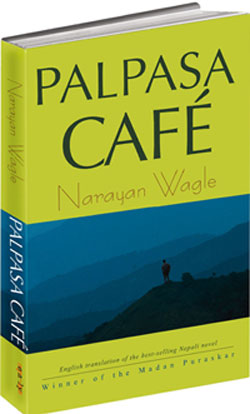By James Sharrock
 The English language translation of the best-selling Nepali novel Palpasa Café by Narayan Wagle is out now. Palpasa Café is the story of an artist, Drishya, who falls in love with a Nepali American returnee, Palpasa and also, via a college friend, sees the effects of Nepal’s conflict in the hills.
The English language translation of the best-selling Nepali novel Palpasa Café by Narayan Wagle is out now. Palpasa Café is the story of an artist, Drishya, who falls in love with a Nepali American returnee, Palpasa and also, via a college friend, sees the effects of Nepal’s conflict in the hills.
Wagle’s book stands out primarily as an alternative account of the war in Nepal and an embodiment of what the central character, Drishya, calls ‘the stand…of the people who resisted the war-mongers on both sides.’ In broad brushstrokes, like the artist Drishya, Wagle too uses the novel to protest ‘against both warring sides…., my colours showing my support for the third camp.’
Wagle best features are in the broader canvas he paints – firstly in the disappearances and general tension of post-royal massacre Kathmandu and then, of the conflict in the hills. Wagle’s descriptions of schools being blown up, emptying villages, indiscriminate bombs, Maoist attacks on district HQs and mourning Nepali families are extremely hard-hitting and powerful. Novels in this form have a resonance than goes beyond anything produced from Wagle’s journalistic day job. Palpasa Café, almost incidentally, also neatly observes the individual stories in many other aspects of Nepal e.g. diaspora Nepalis, Gurkhas, Nepali-foreigner relationships and internal migration for school and work.
There are faults and things perhaps lost in translation. The descriptions and dialogues between Drishya and Palpasa seem, at times, highly stilted. Their awkwardness is intentional but maybe loses something in English. At their first meeting in Goa the repetitive description of Palpasa’s eyes as ‘fresh, juicy’ like ‘slices of pineapple’ sounds downright corny. The vocabulary improves later though. For example Drishya writes a beautiful letter to Palpasa via her Grandmother:
Your hopes are pinned on the gods, the farmers’ on the mountains and mine on you. I made you dance and you were happy.
The day I saw you dance was the happiest day of my life. It was as though the snow on the mountains was melting in the sun and a magnificent rainbow had appeared on the horizon.
Later too the Maoist underground figure Siddhartha and Drishya argue engagingly around the age-old debates of art and politics and whether it is ‘possible to create without destroying’.
Siddhartha, the old college friend and confirmed Maoist, sums up the difference between him and Drishya saying ‘You give too much weight to the importance of the individual.’ Drishya believes ‘in the supremacy of the free individual’ and cannot accept violence and deaths in the name of a supposedly greater communal good. Wagle too runs with this thread and privileges the individual victims’ stories above all other narratives.
There are times when the story comes apart. The description around the killing of Siddhartha, who is alone at the end, appears more much vivid than the bombed bus episode later. We are also asked to believe that Drishya is spectacularly unlucky in terms of being affected by the war. The individual tragedies and conflict inside the main protagonists is not always well connected with the outer violent conflict in Nepal. In general the Maoist figures and security forces have no real role in this novel and are intentionally shadowy, almost non-human ideologues. However, Wagle himself, in his final cameo appearance within the pages, acknowledges with a wink that he might not have done his characters justice and that ‘all written works are incomplete. Something’s always missing. There’s always more to add.’
Wagle’s message throughout the novel seems summed up by a simple boatman who rows Drishya away from death:
The boatman strained against the current. ‘It’s so sad to see war in our country,’ he said. It’s terrible to see our own people die. Don’t you think so, bhai?’

Comments
12 responses to “Reading Palpasa Café in English”
I do not think it will be a justice to comment without reading whole book. But, after reading many many reviews and praises about this book, I feel that Narayan Wagle has produced a golden egg and nowonwards, we can expect to see many quality work in the field of nepalese literature.
If someone can light on me, is there any role of human right activists and lawyers in the novel? Are these animals somehow, helping the cause of main protagonists in the novel? How wagle is successful to cover these activists in the novel and is there any attempt to depict their true intention behind such activisms?
I wonder how a mediocre work like this is being talked even at this point of time .Another proof how mediocre-minded people can afford to loot a country like Nepal and her gullible gentry . There is an infinite possibility to loot this country . Narayan Wagle is skillfully doing the same on every possible front without having to take the pain of telling the truth and swaying with the emotions and winds blown up by foreigners . Why doesn’t anybody out there compose an elegy to the country !
Translation is not very good.
Good luck Mr. Wagle.
The Nepalese version was quite a hit and sold like hot cake. Hope this version also does good.
i had read the Nepali version of the book.. and no doubt it was the most memorable reading for me since very very loong time… now i want to read the English translation also…i am in south india now.. can u tell me how can i get it??
it’s a unique book and i think nobody can write as it is written, i like its conversation and its language which is arranged like 1,2,3,4 …. he is a great potrait …thanx for ur potrait n how caan i get ur e-mail address wud u please provide , i would be very grateful to u .. i hope ur english version will be same as it is …
i just finished the english version of palpasa cafe.
i think it is one of the best novel i have ever read. kudos to Mr. wagle for such wonderful piece. i am quiet hopeful that we readers will have oppurtunity to read more of yours in near future.
Dherai dhanyabad Wagle ji lai. Maile dui/tin choti padi sakyo tara jatti pade pani nirash lagdaina. Tyo kitab ma hamro deshko yethartha, nepali naya santan ko adhunik paribesh,Hajurama lai chithi,chitrakar haruko man ra chitra lai herne a apfno bichar adi ityadi sabai ghatlaagdo chha.Sabailai tyo kitab padna ma nimtyauchhu.
Thanks again
The original book was good, especially the dialogs and flow are captivating. I don’t quite agree with the subject matter though. It’s a biased version of the whole maoist insurgency.
But what I wanted to say here was that the translated version of the book is nowhere near the original version. It doesn’t deliver that experience of smooth flow of the content. This might’ve been caused by the not-so-good translator or it just doesn’t get translated as good in another language.
So if you’re thinking of reading this book and you can understand Nepali language fairly well, I recommend you to read the original version.
hi brother i had read ur book in nepali version.The first book i ever completed no matters the light goes off, i used the candles.I had wonderful time spending with the book.(palpasa cafe) it was great.It was the great work brother.
It’s the book in Nepali version that I ever enjoyed reading in my life.
The content of the story was so capativating that I can’t resist from continuing. Palpasa Cafe- must read book, it was great.
i bought both the versions at once, went through the english version first and found it very beautiful, later I went through the nepali but i liked the english version more than nepali one. Taste differs and having read the english one first, i did not find nepali like the original one, at least to me, english was the original one.
Palpasa Cafe is a very nice book and liked it very much..